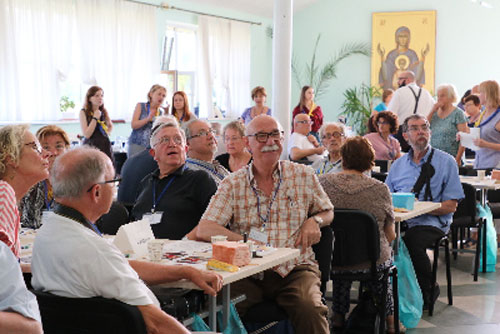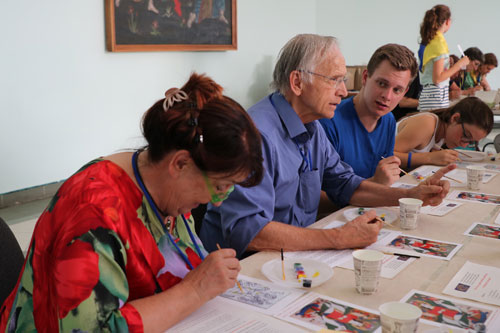Konstantin Gerbrich (Germany): Christians of Europe must be active to convey true values
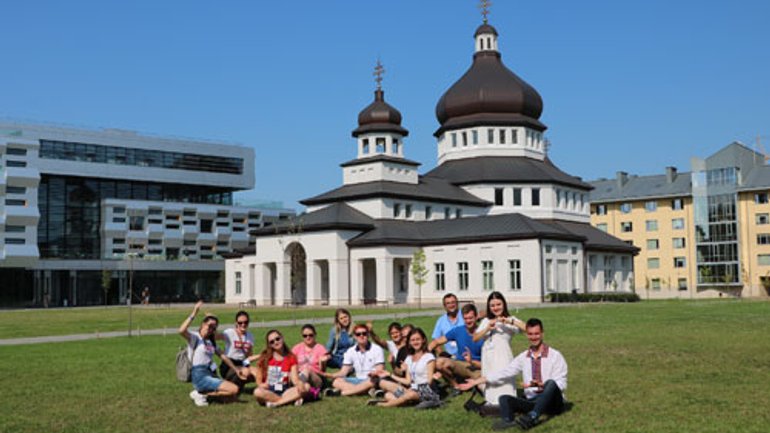
The 30th anniversary Colloquium of European Parishes (CEP), held in Lviv on July 27 — August 1 (first time in Ukraine), brought together clergy and laity from different parts of Europe. The participants shared experience in the life of their parishes and discussed pressing issues. Among them were ten young people from different countries: Italy, Romania, Germany, Malta. The young people who came to Ukraine to discuss with 150 participants "Who will help us to be Christians in modern Europe?" are for the most part very active in their cities, parishes, social activities.
The 30th anniversary Colloquium of European Parishes (CEP), held in Lviv on July 27 — August 1 (first time in Ukraine), brought together clergy and laity from different parts of Europe. The participants shared experience in the life of their parishes and discussed pressing issues. Among them were ten young people from different countries: Italy, Romania, Germany, Malta. The young people who came to Ukraine to discuss with 150 participants "Who will help us to be Christians in modern Europe?" are for the most part very active in their cities, parishes, social activities.
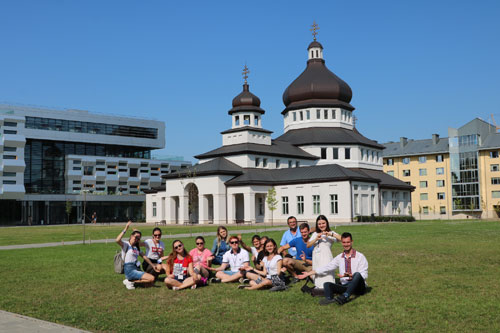
The program of the Colloquium included joint work, as well as group work. An informative tour of Lviv and Ukrainian Catholic University was organized for the young people, which gave more opportunities to get acquainted with the culture and peculiarities of formation of Ukrainian students. As part of the program, the group also had an hour-long discussion and a joint prayer of Taize at the temple of St. Clement the Pope.
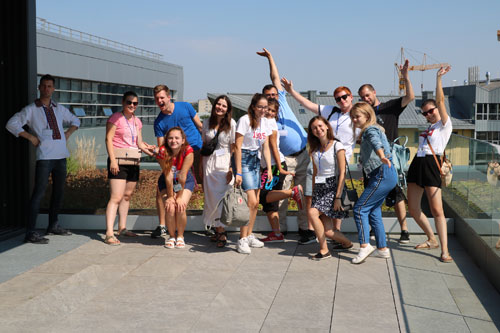
The Colloquium of European Parishes was founded as early as 1960s. First, it was attended by priests who decided to meet and support the development of Church life, and later it was joined by the laity and parishioners of their churches. Since then, every two years parishioners and priests meet in different cities of Europe. This year, they gathered in Lviv, for the first time in Ukraine. It is significant that this is the anniversary Congress, — said the co-organizer of the youth program of the Colloquium, Nadia Shchurko of the Ukrainian Catholic University.
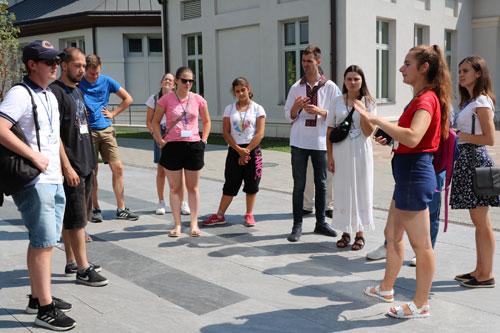
In addition to European guests, Ukrainian youth were also engaged in the work during the Colloquium. This helped exchange experience and establish contacts for further cooperation.
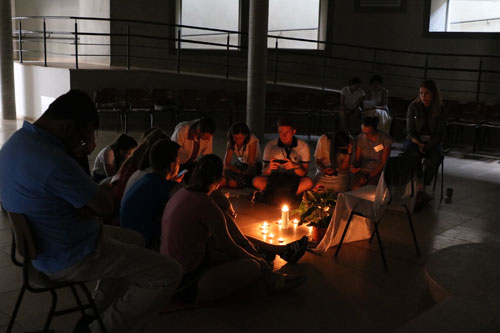
In addition to educational excursions, we also had discussions. The topic of our discussion is Pope Francis and his activities. We identified the 10 most significant steps of Pope Francis and shared our thoughts about them. The most actively discussed topics were those of refugees, marriages and divorces. It was very interesting because the Europeans have a different perception of these issues and, finally, a different experience, added Nadia.
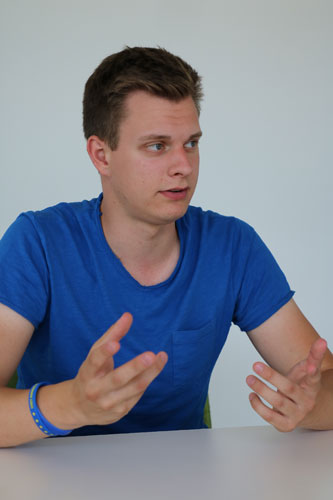
Among the youth participants of the Colloquium, there were many active public figures of Europe. 21-year-old Konstantin Gerbrich takes part in the CEP for the second time. One of the members of the youth organizing Committee of the Colloquium, he heads the Pulse of Europe centre in Hildesheim, Germany. The young man told RISU about what exactly the activity of this organization is and how they, as young people, are trying to convey to society the importance of values for development and security. He also shared his impressions of Ukraine, what he saw in churches and parishes.
- Konstantin, what is the importance of the activities of Pulse of Europe?
— We set up the Pulse of Europe cell in my native Hildesheim two years ago. We are three in our community, although supporters are many enough. Overall, this organization operates in 130 cities in Europe. Our motivation to start such an organization was the fact that the European Union is often represented in the media through scandals, especially since the Brexit took place and Donald Trump was elected President in America. So, we decided that we should take to the streets and say that we love Europe and whatever happens, we are ready to deploy our flag and stand for the EU. As in most cases, people oppose something when organizing rallies. We decided to act differently, to advocate for the fact that Europe ensured peace and this gives everyone the opportunity to travel freely between countries, as well as for the fact that in the EU everyone feels their rights -- including religious -- are protected.
— What events do you organize and to what issues do you devote them?
- This year, from February till May, we held more than 80 different events. There were days when we could only sleep for a few hours because we had a lot of meetings and a lot of work. Our largest demonstration consisted of more than 400 participants. Some key topics: issues of youth employment, Russia, there were demonstrations against populism and right-wing extremism. In particular, it was said that all 28 countries of the European Union should unite and be the driving force not to become a ball between America and Russia. Every Sunday, we also meet in one place and everyone can join us and speak using a microphone. Before the elections to the European Parliament, we went to the students of different schools and had meetings with different politicians, ministers and representatives of the Church elite.
Our main goal is to preserve the European Union and what keeps Europe in peace and religious security. It is important for us that every European understands this.
- Do you touch upon the issues of religion in your activities?
— Pulse of Europe is the organization outside religion and outside politics. That is, no matter what your religion is, you can participate in our events. I grew up in a religious family, but most of our young people don't go to Church and aren't very religious. Basically, the Church in Europe is in decline. That is why it is so important to be active there in order to convey the understanding of true Christian values. We always emphasize that despite various difficulties there are many reasons to live in joy. I even skipped University for a while because I was involved in organizing and conducting church activities. This is extremely important to me.
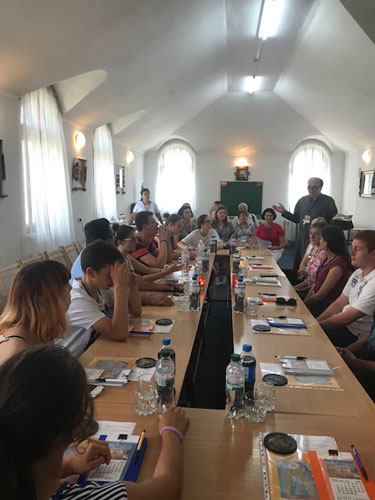
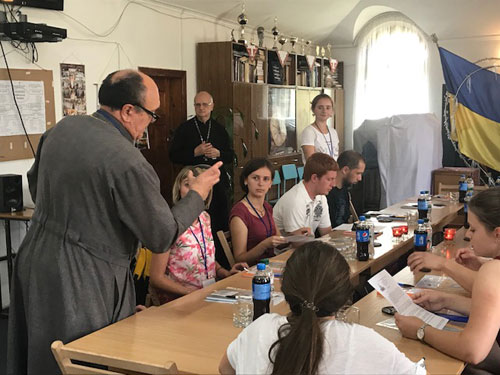
That is why I came here, to the Colloquium of European Parishes to see how parish life is ongoing in Ukraine, what kind of young people are here, what their aspirations are, what they value. I was struck by how many young people attend Liturgies on Sunday.
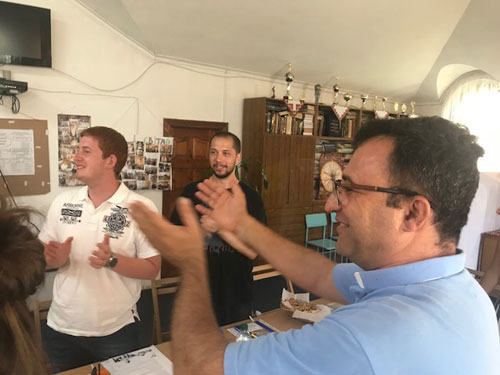
They sing the entire Liturgy, which means that they often visit churches. It is not the case in our place. When we, the youth of the Colloquium, visited one of the Lviv parishes — the Holy Ascension Parish, we were surprised at how active the life of Church communities is.
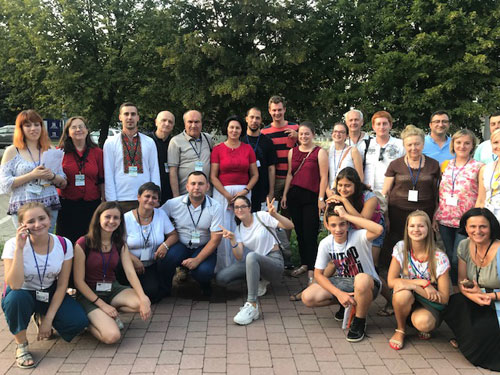
They have various circles at the Church, they even built a bicycle path in the Carpathians for the summer camp, and yet, it is difficult to imagine, but they have a recording studio and their youth group at the church. It's nice to see a priest playing guitar with the young members of the band and everyone singing wonderful songs. I was struck by the sincere and friendly relations between the clergymen and the youth. This parish also arranges for aid to be sent to the front line [in eastern Ukraine]. It's incredible. The parish life in Ukraine is extremely active, priests gather young people around them and this is incredibly important.
— What are your impressions of Ukraine?
- Now, I am in Ukraine for the second time. I remember when I first came here, I had a lot of stereotypes about the country in general and Lviv in particular. I thought it was a small town and there is nothing interesting here. But, having visited it, I was pleasantly surprised. I have been involved in politics for a long time, so I am interested in the situation with Crimea and how the Revolution of Dignity, that is, the Maidan, has affected society. I like the fact that I can experience it all myself here.
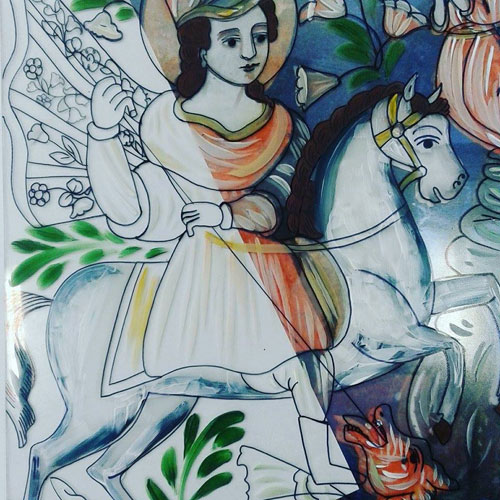
At the end of the third day of the Colloquium, a master class on icon painting on glass was held for all participants. The class supervisor, head of projects and programs of Icon-painting School Radruzh of UCU, Yuliana Krekhovets told the audience the history of icon painting on glass and got them acquainted with the technology. Therefore, each participant -- and they were more than a hundred people -- created the image on the glass which is widespread in the Hutsulshchyna, Pokuttya and Bukovyna ethnic regions of Ukraine.
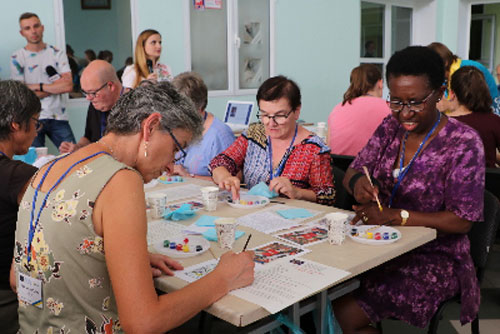
The plot of the icon was the composition of St. George the Dragon Slayer, who is the Patron Saint of Lviv. Therefore, to the excellent Ukrainian music, in good humor and the help of consultants, the Europeans recreated the ancient Ukrainian icon, stroke by stroke.
